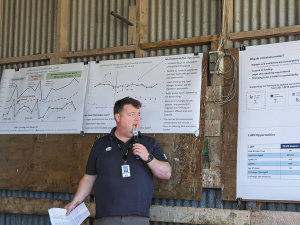Another Windfall for Fonterra Farmers, Unit Holders
Fonterra farmer shareholders and unit holders are in line for another payment in April.
 Sean Spence, Farm Source sustainable dairy adviser for North and Central Canterbury, speaks at the recent LUDF Focus Day.
Sean Spence, Farm Source sustainable dairy adviser for North and Central Canterbury, speaks at the recent LUDF Focus Day.
Fonterra will help farmers meet greenhouse gas emission reduction targets by supporting efficiency gains on-farm, says Farm Source sustainable dairy adviser for North and Central Canterbury, Sean Spence.
Spence was a speaker at a recent Lincoln University Demonstration Dairy Farm (LUDF) Focus Day, where he expanded on Fonterra's Climate Roadmap which was publicly announced last November.
Fonterra has only recently joined SIDDC (South Island Dairy Demonstration Centre), the industry and academia partnership that runs the LUDF, and took a major role in its first farm focus day as a partner.
Spence said Fonterra believes New Zealand milk is the most valuable milk in the world due to our grass-fed farming model, which gives it a carbon footprint one third the global average, but it was important to understand why Fonterra had now set GHG targets.
There were four key drivers, one being access to market and customers.
"The customers we sell to now have emissions targets and are looking within their supply chain as to how they meet those targets."
Spence said Fonterra customers including the likes of Nestle, Mars, Starbucks and Unilever have all set various ambitious reduction targets that they intend to meet in the near future.
"Fifty percent by 2030 and net zero by 2050 is reasonably common and our customers are moving quickly."
Second was access to future funding. Debt capital partners were linking sustainability credentials to loans, and that was already playing out at both farm and co-op level, with interest rate reductions being linked to sustainability initiatives.
Meanwhile, Fonterra is one of around 200 businesses in New Zealand that will soon have to report on climate risk targets and progress towards those targets, under the Financial Markets Act.
Fourthly was Fonterra's aspiration to be a leader of long-term sustainability - which was about building resilience in the business, he said.
"We'll focus on climate, water, and animal wellbeing. Those are three areas where we believe we can lead and create that competitive advantage."
Fonterra had announced the Climate Roadmap at its November 2023 AGM, targeting a 30% intensity reduction in on-farm emissions by 2030 (from a 2018 baseline).
This would be achieved through a numbers of ways:
"This target is collective across all milk supply to the co-op. So we need individual action to achieve a collective result," said Spence.
"We don't really see our role as telling farmers where to fous but more of what are some of the opportunities unique to their farm?"
Under the 7% to be achieved through farming best practise, Spence said that can be organised into three key focus areas: animal efficiency around nutrition, genetics, reproduction and health; nutrient optimisation through feed type and quality, and nitrogen and ethanol management; and 'other' emissions, being imported CO2 from feed, fuel and fertiliser.
Recent weather events in the Bay of Plenty, Gisborne/Tairawhiti, and Canterbury have been declared a medium-scale adverse event.
DairyNZ's chief executive Campbell Parker says the 2024/25 dairy season reinforces the importance of the dairy sector to New Zealand.
A New Zealand agribusiness helping to turn a long-standing animal welfare and waste issue into a high-value protein stream has won the Australian dairy sector's top innovator award.
OPINION: A bumper season all around.
Dairy Women's Network (DWN) has announced that Taranaki dairy farmer Nicola Bryant will join its Trust Board as an Associate Trustee.
Rural Women New Zealand (RWNZ) says it welcomes the release of a new report into pay equity.
OPINION: Staying with politics, with less than nine months to go before the general elections, there’s confusion in the Labour…
OPINION: Winston Peters' tirade against the free trade deal stitched with India may not be all political posturing by the…